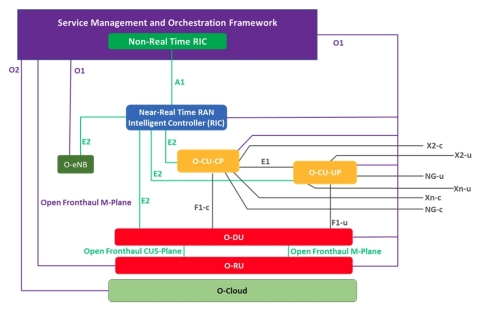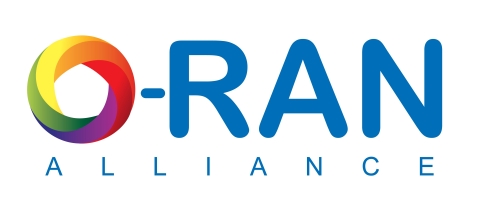BONN, Germany--(BUSINESS WIRE)--In December 2020, the O-RAN Software Community (OSC), working with the Linux Foundation, published its 3rd open software release within 18 months, dubbed “Cherry”.
Cherry moves the O-RAN ecosystem closer to commercial deployments in mobile networks around the globe. On top of new functions aligned with the latest O-RAN specifications, such as the E2, A1 and O1 interfaces, this release also features significant advancements in the end-to-end integration of O-RAN Architecture components to meet the needs of early adopters. In addition, new software projects in the area of Service Management and Orchestration (SMO) have been initiated to drive the development of auto-configuration and management of O-RAN elements.
The main use cases delivered in Cherry include:
- Policy based Traffic Steering using the A1 and E2 interfaces
- Automated Monitoring and Health check of selected components using the O1 interface
- Configuration, Fault and Performance Management Services aligned with OAM models and specifications newly approved by O-RAN
- Life Cycle Management Framework of rApps and xApps using SMO
- O-DU Low and High pairwise testing in O-RAN Software Community lab
- Simulators for testing and integration, such as E2, A1, Open Test Framework, and more
“It is gratifying to see the continued momentum of the OSC’s open-source O-RAN implementation,” said Jack Murray, co-chair of the OSC Technical Operating Committee (TOC) and Assistant Vice President of AT&T. “AT&T is proud to have continued its contributions to enable RAN AI/ML through the Near-Real Time RIC implementation, and to provide a platform for software testing and integration.”
“We are glad to see Cherry has made big progress by building on the base of Bronze,” said Chih-Lin I, the Co-Chair of O-RAN Technical Steering Committee. “It not only realizes more 3GPP-defined models, but also brings O-RAN defined interfaces including E2 and A1 closer to commercialization. More ML and AI technologies are implemented in the RIC, RICAPP and NRTRIC projects to push the traffic steering e2e use case forward, which makes it a more intelligent RAN. The newly created SMO project is also worth special mention for the quick momentum that it has gained in contributing to O-RAN automation and management within just 3 months.”
“Nokia continues to be very active in O-RAN and a major contributor to the O-RAN specifications,” said Pasi Toivanen, Head of Edge Cloud Platforms at Nokia. “With the Cherry Release, Nokia is contributing to the Near-Real-Time RIC and the E2 interface to advance RAN programmability, network openness, and the introduction of AI/ML intelligence to the network. The contributions also deliver increased robustness, more xApp framework capabilities and enhanced manageability of RIC platform and xApps.”
“Radisys continues to contribute actively to O-RAN standardization and open source development. In the Cherry release, Radisys enhanced O-DU L2 implementation to support UE attach, and integrated with PHY (O-DU Low) through the FAPI interface to enable end-to-end testing," said Ganesh Shenbagaraman, Head of Integrated Products and Ecosystems at Radisys.
“highstreet technologies substantially contributes to O1/OAM within both O-RAN and OSC,” said Alfons Mittermaier, Managing Director of highstreet technologies. “We expect the disaggregated O-RAN architecture to become a door opener for small and medium sized enterprises and will deploy the Cherry release in a 5G reference network in Berlin.”
“HCL has contributed to the O-RAN Software Community across different Work Groups starting with the Cherry Release,” said Ramesh Sriraman, the Head of Telecom Center of Excellence at HCL. “We Improved Near-Real-Time RIC platform CI/CD deployment, automation, performance & scale; introduced AI/ML intelligence to RAN network via xApps; and contributed the initial implementation of the O-RAN O1 interface in the O-DU. It is a great honor for HCL to develop together with the OSC team.”
To learn more about the O-RAN Software Community Cherry release please read this O-RAN Blog post, and to access the code, check out the O-RAN Software Community website.
The O-RAN Software Community continues to be open to any participants that want to get involved in the creation of software for future RAN – for more details please visit https://www.o-ran.org/software.
About O-RAN ALLIANCE
The O-RAN ALLIANCE is a world-wide community of more than 240 mobile operators, vendors, and research & academic institutions operating in the Radio Access Network (RAN) industry. As the RAN is an essential part of any mobile network, the O-RAN ALLIANCE’s mission is to re-shape the industry towards more intelligent, open, virtualized and fully interoperable mobile networks. The new O-RAN standards will enable a more competitive and vibrant RAN supplier ecosystem with faster innovation to improve user experience. O-RAN based mobile networks will at the same time improve the efficiency of RAN deployments as well as operations by the mobile operators. To achieve this, the O-RAN ALLIANCE publishes new RAN specifications, releases open software for the RAN, and supports its members in integration and testing of their implementations.
For more information please visit www.o-ran.org.




